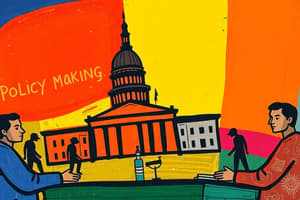Podcast
Questions and Answers
According to Richard Rose, what is public policy?
According to Richard Rose, what is public policy?
- A course or pattern of activity (correct)
- A proposal
- A decision
- A set of laws
What is the nature of public policy, according to the content?
What is the nature of public policy, according to the content?
- It is unrelated to government actions
- It covers activities made for the betterment of citizens and the country (correct)
- It focuses on individual goals
- It relies solely on legal bases
Public policy making involves only one government agency.
Public policy making involves only one government agency.
False (B)
What is the primary aim of formulating public policy?
What is the primary aim of formulating public policy?
Public policies may be found to be either successful or ______ on evaluation.
Public policies may be found to be either successful or ______ on evaluation.
Match the types of public policy with their descriptions:
Match the types of public policy with their descriptions:
Flashcards are hidden until you start studying
Study Notes
Concept of Public Policy
- Public policy is the relationship between a government unit and its environment.
- It is a course or pattern of activity, not just a decision.
- Public policy is a proposed course of action of a person, group, or government within a given environment to utilize opportunities and overcome obstacles.
Objectives of Public Policy
- To promote the welfare of citizens and implement government programs to achieve their goals.
- To solve problems that impact society and the general public.
- To assess whether policies are meeting their goals or not.
- To stabilize markets, promote economic prosperity, and ensure business development and employment.
- To achieve desired outcomes that policymakers wish to achieve.
- To promote happiness and prosperity in citizens.
- To promote social, cultural, political, economic, and scientific development of the nation.
Importance of Public Policy
- To make society lead a better life and maintain the delivery of goods and services.
- To stimulate and develop the economy.
- To increase GDP growth and provide support systems and infrastructure necessary for the economy to perform at maximum output.
- To reduce poverty and unemployment and promote sustainable economic development.
- To implement political manifesto and reform agendas of political parties.
- To enhance prosperity and happiness in citizens.
- To manage administrative tasks and maintain law and order.
Nature of Public Policy
- Public policy covers the activities of the government made for the betterment of citizens and the country.
- Each level of government may have its specific as well as general policies.
- Policymaking is closely related to decision-making but is not the same as the latter.
- Policies carry certain vision, goals, objectives, strategies, and activities.
- Public policies are formulated on the basis of certain constitutional and legal bases.
Public Policy Making
- Public policies are crafted by the legislature, executive, and judiciary and are evaluated by policy analysts, experts, media, and political leaders.
- The process involves problem identification, agenda setting, policy formulation, policy adoption, policy implementation, and policy evaluation.
Approaches to Public Policy
- Political system theory: policy is the output of the political system.
- Group theory: interest groups pressure and interact with policymakers on preferences and self-interest.
- Elite theory: policy reflects the values and preferences of governing elites.
- Rational choice theory: the government should choose policies resulting in maximum gains to society.
- Institutional theory: public policy is determined by government institutions.
- Incremental model: evaluates public policy as small changes or adjustments in past policies.
- Game theory: the study of rational decisions in situations where two or more participants have choices to make and the outcome depends on the choices made by each.
Characteristics of Public Policy Making
- Public policy is a process that takes into play multiple components.
- Public policy making demands coordination between different individuals and institutions.
- A successful public policy is yielded out of the procedures when each of them coordinates and performs well with their duties and responsibilities.
- Public policy is a complex dynamic process that changes from time to time.
- The primary aim of formulating public policy is to lay guidelines for the public with regard to a certain problem of general concern.
Types of Public Policy
- Substantive: policies concerned with the general welfare and development of society.
- Regulatory: deals with the regulation of trade, business, safety measures, etc.
- Distributive: focuses on specific sectors of society.
- Redistributive: concerned with the rearrangement of policies aimed at making socio-economic changes.
- Capitalization: the government provides subsidies to different lower levels of government and other business undertakings.
Sources of Public Policy
- Constitution
- Periodic plans
- Political parties' manifestos
- Political system
- Court orders
- International conventions and declarations
- Political, economic, and socio-cultural context
- Geographical context
- Human and technical resources
- People's demand
- Interest groups
- Reform agendas
- Foreign policy and diplomatic relations
Qualities of Good Policy
- Legitimate
- Rational
- Politically and socially acceptable
- Time, cost, and capacity-based
- Effective, economical, and efficient
- Technically acceptable
- Environment-friendly
- Participative
- Need and result-based
- Equality and equity-based
Studying That Suits You
Use AI to generate personalized quizzes and flashcards to suit your learning preferences.



